President Vladimir Putin’s extra-heavy emphasis on new strategic missile systems in his March 1 address to parliament was quite unexpected and rather out of character. My colleague Steven Pifer suspects that Putin has “something of a fixation on things nuclear” and compares this trumpeting of wonder-missiles with President Donald Trump’s slogan “Jobs! Jobs! Jobs!” Putin is, after all, campaigning for re-election (the vote is March 18), though the outcome is pre-determined.
In fact, Putin’s animated presentation betrays ignorance rather than interest in missile technologies. He has indeed expounded on nuclear-strategic matters quite a few times, but not recently—and never in such fanciful detail. Careful assessments of Russian missile programs are necessary, but they cannot explain what prompted Putin to go ballistic—and why now?
Missiles-R-Us
One part of the answer could be in plain sight: It was only in late February that Putin finally signed the long-postponed 2027 State Armament Program, a procurement plan for which defense industries fiercely lobbied and which the Finance Ministry desperately tried to cut. Several missile design bureaus are among the winners in this budget battle: They have managed to sell to the commander-in-chief their “innovative” projects developed back in the 1980s as Soviet asymmetric responses to President Ronald Reagan’s Strategic Defense Initiative. Putin now feels the need to justify his decision, and this bureaucratic logic clashes absurdly with strategic common sense: He brags about virtual missiles able to break through the non-existent American missile defense.
Strategic weapons were the main priority in the not-that-successfully-executed 2020 State Armament Program, but the top brass prefers not to elaborate on its many shortcomings. One of the most troubling is the performance of the Bulava missile for the Borei-class submarines, which has a checkered record of tests, but was launched only once in 2017, and once in 2016. It is increasingly obvious that the huge investment in this new generation of strategic submarines is a luxury that Russia can ill afford. Their patrols make no difference whatsoever in the theaters where real security threats need to be managed—from the Donbass war zone to the border with North Korea. In addition to the three now-operational Borei-class subs, five more keels are laid down, so more money needs to be channeled into this exorbitant program. Putin needs to find a way to harvest any political dividends he can from this investment, and making missiles into the main theme of his annual address is a reasonably safe way to score a few cheap points.
The only missile program that really matters in today’s world is the one developed by SpaceX, and many Russians were amazed by Elon Musk’s audacious stunt performed at his own expense. Roskosmos, which managed 19 space launches in 2017, is merely exploiting the Soviet technological heritage, and Putin’s strategic animation pales in comparison with the breathtaking image of a red Tesla roadster travelling in deep space.
The Syrian connection
Another part of the answer, paradoxical as it may seem, could be found in Syria. Putin clearly planned to make Russia’s “victory” in this messy war into a key theme for his re-election campaign, but due to recent battlefield mishaps is now reduced to praising the heroism of Roman Filipov, a Su-25 pilot who was shot down over the Idlib province on February 3. With the curtailing of its military intervention, Moscow has lost most of its capacity for controlling the course of the conflict, and the crash of An-26 transport plane last Tuesday made that abundantly clear.
The sustained air war, augmented with occasional launches of long-range cruise missiles, was supposed to demonstrate Russia’s ability to wage high-tech war—just like the United States. The devastating U.S. strike on a band of pro-Assad forces reinforced by Russian mercenaries on February 7 undermined that claim. The U.S. command amassed such powerful combination of assets—from the B-52 strategic bombers and C-130 gunships to Reaper drones—that the Russian grouping at the Khmeimim airbase looks feeble. The first direct clash between U.S. and Russian forces could have had bad strategic consequences, so Putin had to deny responsibility for the attack by the so-called “Wagner group.”
Moscow is obviously at loss in the new stage of the Syrian war, where its allies are fighting their own battles. Turkey is battling not only the Kurds but also the Syrian government forces in Afrin, Iran is building new bases in order to target Israel, and the Assad forces keep pounding the Eastern Ghouta despite Russian attempts to secure a “humanitarian pause.” Putin has no clue about engaging in or escaping from this multi-dimensional war, and the show of strategic missiles provided a distraction of sorts.
Restoring Russia’s relevance
Putin’s emotional comment in his speech that “nobody wanted to listen to us…so listen now” contains yet another part of the answer, though it doesn’t mean that Russia is ready to talk. Moscow has shown no inclination to resume meaningful negotiations on strategic arms control, and Deputy Foreign Minister Sergei Ryabkov cancelled scheduled consultations on strategic stability with U.S. Under Secretary of State Thomas Shannon this week. Foreign Minister Sergei Lavrov’s remarks at the recent Conference on Disarmament in Geneva amounted to accusing the United States of preparing for a nuclear war in Europe. And Putin’s address did nothing to dispel persistent U.S. accusations that Russia is in violation of the 1988 Intermediate-Range Nuclear Forces (INF) Treaty.
It is not that Putin strives to start negotiations, but rather that he wants to arrest the decline of Russia’s relevance on the international arena. First of all, he needs to reinforce the delusion of “greatness” in the eyes of his domestic audience, and his speech’s emphasis on missiles indeed induced a standing ovation. Another important addressee, quite possibly, was China, which is inclined to take the “strategic partnership” with Russia for granted and was mentioned only once in Putin’s speech. Sustained joint efforts by the United States and China in managing the North Korean crisis (which Putin didn’t find opportune to mention at all) upsets Moscow, which cannot contribute meaningfully to this counter-proliferation work but resents the neglect.
Russia’s economic weakness is so profound that Russia cannot possibly engage in anything resembling a real arms race with the United States and NATO. Putin’s enthusiastic rollout of Russia’s missile program scored many good points domestically but produced a mixed impression among his key international audiences. It doesn’t take a shrewd strategic mind to conclude that Russia can only proceed with these entirely unnecessary weapon programs at the expense of addressing its more pressing economic needs and acute security challenges, including Syria. Putin’s posturing cannot meet many strict reality checks, but it is nevertheless, dangerous because it damages the norm of owning nuclear weapons responsibly.
The Brookings Institution is committed to quality, independence, and impact.
We are supported by a diverse array of funders. In line with our values and policies, each Brookings publication represents the sole views of its author(s).

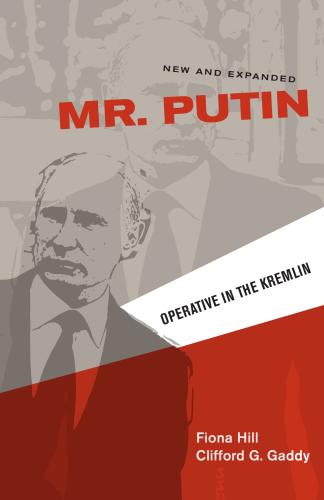
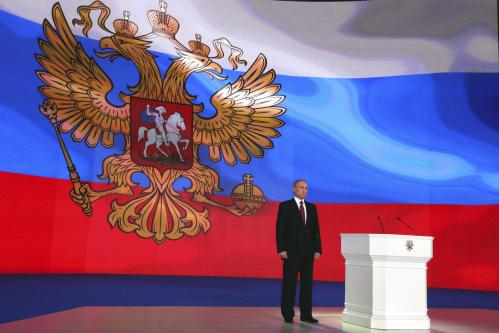
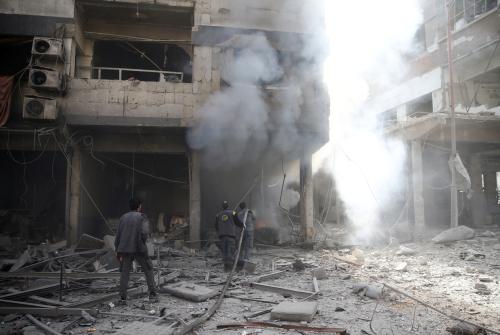

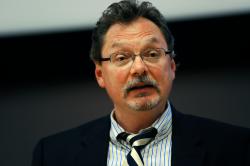


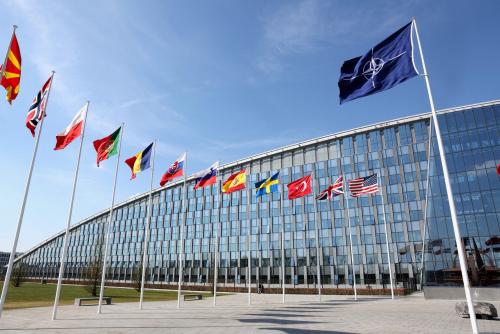
Commentary
Missiles of March: A political means of last resort for Putin
March 7, 2018